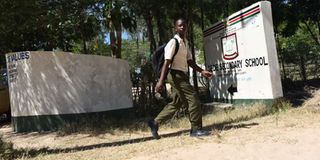Premium
Gede schools too few and far between, villagers say

A Gede Secondary School student walks home from school on March 7.
What you need to know:
- She said that, apart from the girls, boy have also been affected with many of them dropping out of school.
- Children are forced to trek for over 12 kilometres in wild terrain to Jira Primary School in Ndarako, the nearest institution of learning.
Residents of Gede sub-location in Ganze constituency have decried the lack of adequate primary schools and early childhood education centres (ECDEs) in the area, saying this had contributed to late enrolments and a high rate of teenage pregnancies.
Children are forced to trek for over 12 kilometres in wild terrain to Jira Primary School in Ndarako, the nearest institution of learning. Speaking at Ndarako trading centre in Shirango, village elder Mzee Barisa Thise said children were suffering.
“Our children walk long distances to school. They have to start learning later than usual because this is the only way they can cope with the long trek and harsh weather,” said Mr Thise.
He added that efforts by the villagers to put up make-shift schools had been hampered by lack of construction materials and teachers. He said most children start attending school at the age of over ten years.
Prone to floods
He said the area is prone to flooding, which has made it difficult for build mud-and-wattle classrooms, while pit latrines often cave in due to weak soils.
“We need a modern school with permanent structures,” he said, adding that Gede boarders Tsavo East National Park, which presents another risk of wildlife attacks. He said the wild animals often attack homes killing livestock, destroying crops and pose a threat to humans especially school children who walk long distances through thick bush.
“Our children are always in danger of being attacked by wild animals. That is why parents have to wait for their children to grow almost into their teens for them to start school,” Mr Thise said, noting that the late enrolment often resulted in early pregnancies.
Fallen pregnant
“Many of our girls who have fallen pregnant are aged over 18 years but are still in primary school,” he said. Mr Thise called on the county government to build more ECDEs to encourage children to start learning at the required age. Another resident, Ms Riziki Wario, said the government should come up with plans to ensure there are enough learning institutions in the sub-location to serve children at all levels.
She said that, apart from the girls, boy have also been affected with many of them dropping out of school.
“Our boys are being wasted back in the villages because they were forced to drop out of school because of the shame of learning while they are all grown up. We want the government to construct enough ECDEs and primary and secondary schools as well as youth polytechnics for our children to acquire different skills,” she said.
According to a research done by the Kenya Institute of Curriculum Development (Kicd), Kenya National Examination Council (Knec) and other organisations, 85 percent of the students sitting for final exams in Kilifi County are overage.





